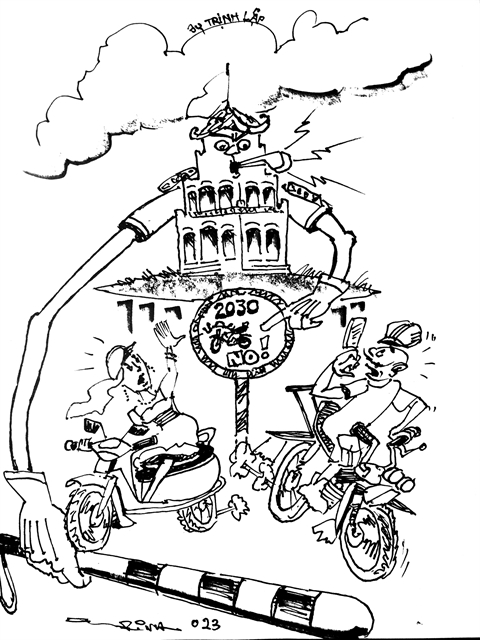 Talk Around Town
Talk Around Town

 |
| Illustration by Trịnh Lập |
by Nguyễn Mỹ Hà
Do you dream that one day, you won't see any motorbikes or be suffocated by their smoke?
On a beautiful Sunday morning, my child asked, "Mummy, do you think the government should ban motorbikes? Hà Nội's air quality is so poor now, its pollution stands behind only Pakistan! We need to do something to improve our air quality."
The social awareness of high school children today is impressive: they understand well and want to act on climate change, social inequality, and gender or racial discrimination.
Air pollution is the dark side of a beautiful Hà Nội, everyone wants to curb it, and it seems everyone is pointing the finger at the millions of motorbikes that roam city streets, day and night.
This month, the daily PM2.5 air concentration was over 10 times the World Health Organisation air quality guideline.
These are the reasons to curb the use of motorbikes in the country. Urban air pollution, traffic jams, and messy city views.
One thing everyone agrees on is the need to reduce air pollution.
Motorbikes since the early days of đổi mới [economic renewal] have closely been associated with entrepreneurship, small business owners, and xe ôm motor taxis.
Poor public transportation in Việt Nam's cities and towns makes it very difficult to travel from one place to another.
Those who believe motorbikes are the culprits must consider that two people travelling on a motorbike consume less gas and produce less emissions than a four-seat car. Consider the size of the streets in Việt Nam, if you took out all the motorbikes, only cars and buses would remain. Would it be less jammed?
If directed by traffic police and local voluntary traffic wardens, motorbike traffic can be dealt with much faster than a long line of cars and bigger vehicles.
Motorbikes in Việt Nam are not just a means of transport, they are also the livelihood of people who make ends meet by selling their homemade morning coffees, rice buns, and snacks.
Motorbikes carry vegetables, meat and poultry from outskirts farms to inner-city wet markets fast and efficiently.
Those who argue that motorbikes in the city's inner streets must be banned, must then also argue that private cars be treated the same.
Those against a bike ban point out that even in big cities in the world where they do not have so many motorbikes, there are still traffic jams. Look at London, New York, Guangzhou or Beijing.
The issue we need to tackle is to consistently reduce air pollution, and provide alternative safe public transport, such as the public metro, buses and taxis. If basic public transport cannot carry the majority of commuters in a city, it's meaningless to ban motorbikes. It will create further chaos and make the lives of more than half of city dwellers more miserable.
If you go out of big cities, in the countryside, motorbikes are the main means of transport and are involved in the majority of road accidents. Every public holiday, reporting is marred by the high toll of road accidents.
In Việt Nam, there are 72 million motorbikes in use, and every year millions more new bikes get licences. In the country's smaller cities and towns, travel by motorbike solves family travel issues, and households with two children usually have at least two motorbikes.
In remote areas or mountains, motorbikes are the vehicles that carry visitors to hill-tribe houses, the sick to town hospitals, and teachers to their schools.
Accessories associated with motorbikes include helmets, motorbike gear and clothing, and gas. These businesses employ millions of jobs that should not be cut just due to political decision-making.
According to Việt Nam's Association of Motorcycle Manufacturers, by the end of 2022, more than 3 million motorbikes were sold.
These were mainly from five manufacturers: Honda, Yamaha, Suzuki, SYM, and Piaggio. Electric bikes, large-capacity bikes and privately imported bikes WERE not included in this toll.
Việt Nam is the second-biggest motorbike consumer in Southeast Asia, second only to Indonesia. While the sales numbers are good, in terms of the environmental impact, it is just not sustainable.
In 2023, both Honda and Yamaha, market leaders in motorbikes manufacturing introduced new models appealing to youth, with sporty designs.
A recent study by the Việt Đức University in Hồ Chí Minh City concluded that in 2030, motorbike use will be a top priority for urban citizens. The number of people opting for motorbikes was 56-89 per cent while those opting for public transport was as low as less than 1 per cent.
Only one-third of people truly believe that a motorbike ban by 2030 will be effective. Most think a ban on motorbikes will not become a reality.
Only when public transport gets proper government investment to operate and function effectively can you start to seriously consider reducing motorbike use. VNS




